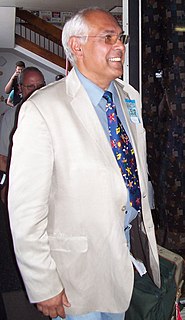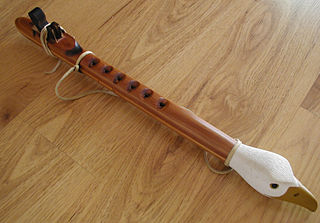
Trevor Alfred Charles Jones is a South African composer of film and television scores. Having spent much of his career in the United Kingdom, Jones has worked on numerous well-known and acclaimed films including Excalibur, Runaway Train, The Dark Crystal, Labyrinth, Mississippi Burning, The Last of the Mohicans, and In the Name of the Father; collaborating with filmmakers like John Boorman, Andrei Konchalovsky, Jim Henson, and Michael Mann. He has composed for numerous films and his music has been critically acclaimed for both its depth and emotion, and he has been nominated for two Golden Globe Awards and three BAFTA Awards for Best Film Music.

The Mohican are an Eastern Algonquian Native American tribe that historically spoke an Algonquian language. As part of the Eastern Algonquian family of tribes, they are related to the neighboring Lenape, whose indigenous territory was to the south as far as the Atlantic coast. The Mohican lived in the upper tidal Hudson River Valley, including the confluence of the Mohawk River and into western New England centered on the upper Housatonic River watershed. After 1680, due to conflicts with the powerful Mohawk to the west during the Beaver Wars, many were driven southeastward across the present-day Massachusetts western border and the Taconic Mountains to Berkshire County around Stockbridge, Massachusetts.

Henry Dreyfuss Brant was a Canadian-born American composer. An expert orchestrator with a flair for experimentation, many of Brant's works featured spatialization techniques.

Jacques François Antoine Marie Ibert was a French composer of classical music. Having studied music from an early age, he studied at the Paris Conservatoire and won its top prize, the Prix de Rome at his first attempt, despite studies interrupted by his service in World War I.

David Conte is an American composer who has written over 150 works published by E.C. Schirmer, including six operas, a musical, works for chorus, solo voice, orchestra, chamber music, organ, piano, guitar, and harp. Conte has received commissions from Chanticleer, the San Francisco Symphony Chorus, Harvard University Chorus, the Men’s Glee Clubs of Cornell University and the University of Notre Dame, GALA Choruses from the cities of San Francisco, New York, Boston, Atlanta, Seattle, and Washington, D.C., the Dayton Philharmonic, the Oakland Symphony, the Stockton Symphony, the Atlantic Classical Orchestra, the American Guild of Organists, Sonoma City Opera, and the Gerbode Foundation. He was honored with the American Choral Directors Association (ACDA) Brock Commission in 2007 for his work The Nine Muses, and in 2016 he won the National Association of Teachers of Singing (NATS) Art Song Composition Award for his work American Death Ballads.
Jerod Impichchaachaaha' Tate is a Chickasaw classical composer and pianist. His compositions are inspired by American Indian history, culture and ethos.

Raymond Carlos Nakai is a Native American flutist of Navajo and Ute heritage. Nakai played brass instruments in high school and college, and auditioned for the Armed Forces School of Music after a two-year period in the United States Navy. He began playing a traditional Native American cedar flute after an accident left him unable to play the trumpet. Largely self-taught, he released his first album Changes in 1983, and afterward signed a contract with Canyon Records, who produced more than thirty of his albums in subsequent years. His music prominently features original compositions for the flute inspired by traditional Native American melodies. Nakai has collaborated with musicians William Eaton, Peter Kater, Philip Glass, Nawang Khechog, Paul Horn, and Keola Beamer. He has received 11 Grammy Award nominations for his albums.

The Native American flute is a flute that is held in front of the player, has open finger holes, and has two chambers: one for collecting the breath of the player and a second chamber which creates sound. The player breathes into one end of the flute without the need for an embouchure. A block on the outside of the instrument directs the player's breath from the first chamber—called the slow air chamber—into the second chamber—called the sound chamber. The design of a sound hole at the proximal end of the sound chamber causes air from the player's breath to vibrate. This vibration causes a steady resonance of air pressure in the sound chamber that creates sound.
Bill Miller is a Native American singer/songwriter and artist of Mohican heritage. He is a guitarist, player of the Native American flute and painter.
Michael Isaacson is a composer of Jewish synagogue music, and one of the originators of the Jewish camp song movement. His camp songs were often written and premiered on the same day, defining the camp music movement in the 1960s, and having been cited as a key influence by modern Jewish pop stars such as Debbie Friedman and Craig Taubman.
Paul Seiko Chihara is an American composer.

Michael McGlynn is an Irish composer, producer, director, and founder of the vocal ensemble Anúna.

The Wappinger were an Eastern Algonquian Munsee-speaking Native American people from what is now southern New York and western Connecticut.

The Stockbridge–Munsee Community also known as the Mohican Nation Stockbridge–Munsee Band is a federally recognized Native American tribe formed in the late eighteenth century from communities of so-called "praying Indians", descended from Christianized members of two distinct groups: Mohicans and Wappinger from the praying town of Stockbridge, Massachusetts, and Munsees, from the area where present-day New York, Pennsylvania and New Jersey meet. Their land-base, the Stockbridge–Munsee Indian Reservation, consists of a checkerboard of 24.03 square miles (62.2 km2) in the towns of Bartelme and Red Springs in Shawano County, Wisconsin. Among their enterprises is the North Star Mohican Resort and Casino.

The Business of Fancydancing is a 2002 film written and directed by Sherman Alexie. It is loosely based on his 1992 book of the same name, a collection of stories and poems.

The Stockbridge Militia was a Native American military unit from Stockbridge, Massachusetts which served in the Continental Army during the American Revolutionary War. The militia unit was composed mostly of Mohican, Wappinger, and Munsee from the Stockbridge area. While most northeastern tribes, such as Joseph Brant's Mohawks, aligned themselves with the British, the Stockbridge tribes allied with the American Patriots. Led by Jehoiaikim Mtohksin and Abraham Nimham, they were the first group of Native Americans to fight for the cause of American independence during the Revolutionary War.
World Voices was a vocal ensemble based in Minneapolis/Saint Paul, conducted by Dr. Karle Erickson, Artistic Director. The ensemble was founded in 1996 as "Karle Erickson’s Metropolitan Chorale", but changed its name to World Voices within one season. It performed until its dissolution in 2008. At each of its concerts, World Voices focused on the music of a particular culture or region of the world. Membership in the chorale has ranged from about 25 to 40 vocalists over its 13 years of existence.
Steven Sametz is active as both conductor and composer. He has been hailed as "one of the most respected choral composers in America." Since 1979, he has been on the faculty of Lehigh University in Bethlehem, Pennsylvania, where he holds the Ronald J. Ulrich Chair in Music and is Director of Choral Activities and is founding director of the Lehigh University Choral Union. Since 1998, he has served as Artistic Director of the professional a cappella ensemble, The Princeton Singers. He is also the founding director of the Lehigh University Summer Choral Composers’ Forum. In 2012, he was named Chair of the American Choral Directors Association Composition Advisory Committee.

The Red Road is a 1993 country music album by Native American singer Bill Miller. The album was his major-label debut, with Warner Western, and brought him to a broader popular country music public. The album has been classed among classic country "drivers'" albums.












